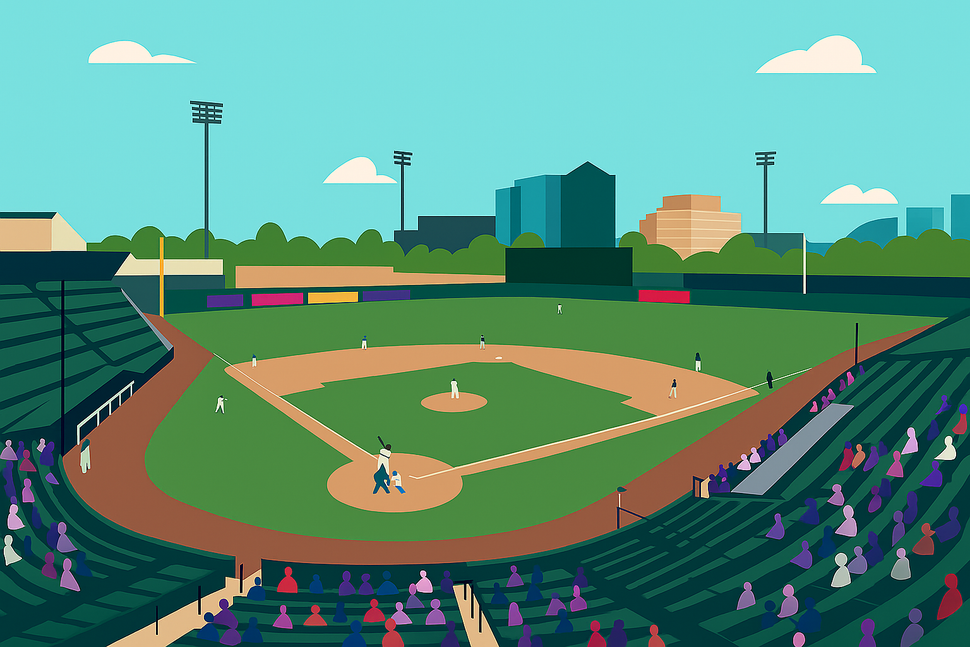By Mauricio Segura August 12, 2025

Photo: GBT Graphics
By mid-August, the Athletics had hoped their move to West Sacramento would breathe some life into a franchise that has spent years searching for stability, but instead they find themselves confronting rows of empty seats and a community that seems hesitant to embrace them. The lowest home attendance of the season came on August 11, when just 7,731 fans turned out for a game against Tampa Bay, a figure that looked even smaller inside Sutter Health Park’s 12,000-plus capacity. That night was not an anomaly but part of a troubling pattern, as crowds have dipped below 10,000 for weeks, with the last significant surge of fans arriving back in July for a Lawrence Butler bobblehead giveaway. What the A’s are discovering is that Sacramento’s patience, and perhaps its interest, is limited when the team itself feels like a tenant rather than a neighbor. The decision to market themselves simply as the “Athletics,” without any nod to Sacramento in name or branding, has left many locals feeling like an afterthought. As one fan put it, if the team is not going to embrace the city, why should the city embrace the team? The branding void has compounded an already fragile relationship, and even those who bought in early with season tickets are now left holding assets that have plummeted in value. More than six thousand season ticket packages were sold before the year began, but resale prices quickly collapsed, with seats now moving for just a few dollars or being given away altogether. Some fans have resigned themselves to losing money, finding consolation in sharing the tickets with friends or families who simply want the ballpark experience, but the sting of buyer’s remorse runs deep.
The frustration is not entirely about attendance figures. It is also about the nature of the A’s presence in Sacramento. Everyone knows this stopover is temporary, a bridge to a hoped-for stadium in Las Vegas, and that knowledge colors every interaction between club and community. When residents see national headlines about financing issues, construction delays, or uncertainty in Nevada, it hardly builds confidence that the A’s intend to commit anywhere at all, let alone Sacramento. That sense of impermanence is reinforced every night at Sutter Health Park, a charming minor league stadium stretched beyond its intended purpose. With just over ten thousand fixed seats and modest amenities, it lacks the grandeur of modern major league venues, and although upgrades have been made, the bones remain those of a Triple-A ballpark. This would not be such a glaring issue if the team projected a sense of shared identity with its host city, but without “Sacramento” stitched onto jerseys or woven into its message, the A’s feel like guests passing through rather than a club building roots.
What makes the situation more ironic is Sacramento’s proven appetite for baseball. The River Cats, who still call Sutter Health Park home, once led all of minor league baseball in attendance for years, drawing fans with consistency and enthusiasm. The same city that filled the ballpark season after season for Triple-A games has turned cool on Major League Baseball not because of the sport itself but because of how the organization has managed the relationship. The fans have demonstrated they will show up when the team shows commitment, but what they have received from the A’s instead is ambiguity, branding missteps, and a transactional approach that offers little in return for loyalty. Even efforts like special promotions or player milestones have been unable to mask the larger issue: a fan base is not built through gimmicks but through trust, and in Sacramento trust is in short supply.
If the A’s ultimately make it to Las Vegas as planned, their Sacramento tenure may be remembered not as a new beginning but as a warning. Without respect for the people and place that host you, attendance figures become the least of your worries, because the absence of fans is only the symptom of a deeper problem. A franchise that has spent decades moving cities, fighting lawsuits, and chasing stadium deals continues to treat each stop as a waiting room, and Sacramento’s fans have responded by keeping their distance. Empty seats tell the story more powerfully than any press release could: in this market, the Athletics are not seen as Sacramento’s team, and until that changes, it is unlikely those seats will fill.















